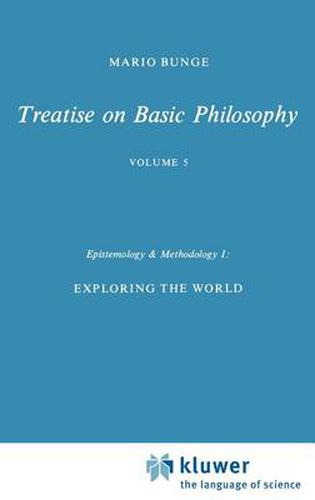Readings Newsletter
Become a Readings Member to make your shopping experience even easier.
Sign in or sign up for free!
You’re not far away from qualifying for FREE standard shipping within Australia
You’ve qualified for FREE standard shipping within Australia
The cart is loading…






This title is printed to order. This book may have been self-published. If so, we cannot guarantee the quality of the content. In the main most books will have gone through the editing process however some may not. We therefore suggest that you be aware of this before ordering this book. If in doubt check either the author or publisher’s details as we are unable to accept any returns unless they are faulty. Please contact us if you have any questions.
In this Introduction we shall state the business of both descriptive and normative epistemology, and shall locate them in the map oflearning. This must be done because epistemology has been pronounced dead, and methodology nonexisting; and because, when acknowledged at all, they are often misplaced. 1. DESCRIPTIVE EPISTEMOLOGY The following problems are typical of classical epistemology: (i) What can we know? (ii) How do we know? (iii) What, if anything, does the subject contribute to his knowledge? (iv) What is truth? (v) How can we recognize truth? (vi) What is probable knowledge as opposed to certain knowledge? (vii) Is there a priori knowledge, and if so of what? (viii) How are knowledge and action related? (ix) How are knowledge and language related? (x) What is the status of concepts and propositions? In some guise or other all of these problems are still with us. To be sure, if construed as a demand for an inventory of knowledge the first problem is not a philosophical one any more than the question ‘What is there?’. But it is a genuine philosophical problem if construed thus: ‘What kinds of object are knowable-and which ones are not?’ However, it is doubtful that philosophy can offer a correct answer to this problem without the help of science and technology. For example, only these disciplines can tell us whether man can know not only phenomena (appearances) but also noumena (things in themselves or self-existing objects).
$9.00 standard shipping within Australia
FREE standard shipping within Australia for orders over $100.00
Express & International shipping calculated at checkout
This title is printed to order. This book may have been self-published. If so, we cannot guarantee the quality of the content. In the main most books will have gone through the editing process however some may not. We therefore suggest that you be aware of this before ordering this book. If in doubt check either the author or publisher’s details as we are unable to accept any returns unless they are faulty. Please contact us if you have any questions.
In this Introduction we shall state the business of both descriptive and normative epistemology, and shall locate them in the map oflearning. This must be done because epistemology has been pronounced dead, and methodology nonexisting; and because, when acknowledged at all, they are often misplaced. 1. DESCRIPTIVE EPISTEMOLOGY The following problems are typical of classical epistemology: (i) What can we know? (ii) How do we know? (iii) What, if anything, does the subject contribute to his knowledge? (iv) What is truth? (v) How can we recognize truth? (vi) What is probable knowledge as opposed to certain knowledge? (vii) Is there a priori knowledge, and if so of what? (viii) How are knowledge and action related? (ix) How are knowledge and language related? (x) What is the status of concepts and propositions? In some guise or other all of these problems are still with us. To be sure, if construed as a demand for an inventory of knowledge the first problem is not a philosophical one any more than the question ‘What is there?’. But it is a genuine philosophical problem if construed thus: ‘What kinds of object are knowable-and which ones are not?’ However, it is doubtful that philosophy can offer a correct answer to this problem without the help of science and technology. For example, only these disciplines can tell us whether man can know not only phenomena (appearances) but also noumena (things in themselves or self-existing objects).